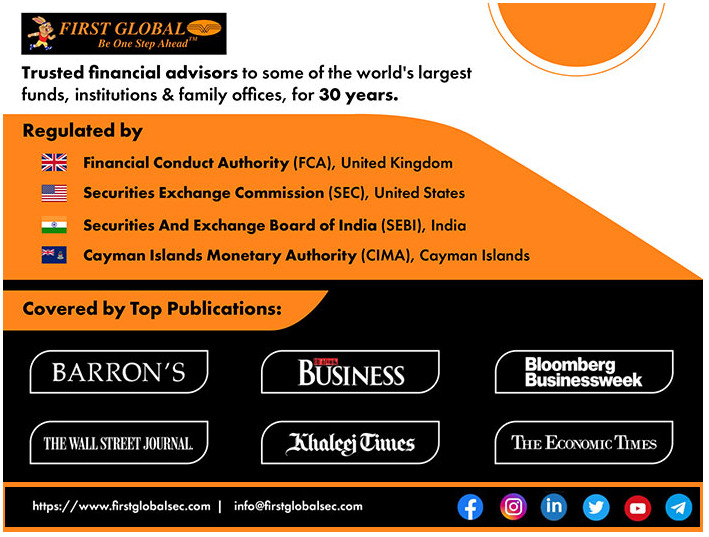Devina Mehra, with no family wealth, made this tiny capital into large, multi-country businesses.
Through Learning. Came the Earning. In the markets, there is no lasting wealth without knowledge which usually comes from reading. Of course, now videos, podcasts etc. are also available.
Here are some books that you may enjoy, whether you are just starting on your investment journey or are already further along the way.
I have split them into 5 categories:
I. Books to understand the way our own mind works
(Including Our Own Biases, Blind Spots and Fallacies in Thinking)
Before you can conquer the world, you must conquer your own mind and more importantly, understand it!
As a starting point, I would recommend these few books starting with 'Thinking Fast and Slow' by the Nobel laureate Daniel Kahneman.
It is a comprehensive look at how your own thinking can mislead you. How the automatic, fast, intuitive, 'natural' thinking that you rely on for most things in life - the one that feels right may be actually completely wrong in objective terms; the many biases like Endowment Bias (when you value something more highly, simply because you own it), Recency Bias (when you think what is the norm now was always the case, or what is hitting the headlines is the most important thing in the world), Loss Aversion (which makes it difficult for you to book losses because it causes too much pain), Anchoring Bias and many more - all of which can derail not just your regular life but also your investing and trading career.
The caveat of course is that just because you understand what investing biases are, does not mean that you will be able to eliminate them from your thinking.
A second important book by the same author is 'Noise' which goes beyond biases into how random variations between supposedly equally skilled people (like judges, insurance valuers etc) can cause big variations in outcomes.
'The Invisible Gorilla: And Other Ways Our Intuitions Deceive Us' by Christopher Chabris & Daniel, talks about the illusions of our mind: About how our minds are finite resources and hence, from our attention to our memories we perform far below than what we think we do.
It deals with some of the reasons as to why human beings make bad witnesses to how confidence is no proxy for competence. A very useful book to make you aware of several illusions you carry as you go about the world.
Even if elimination of these illusions is not possible, the awareness that these exist, changes the lens through which you see the world.
'Misbehaving: The Makings of Behavioral Economics' by Richard Thaler also illustrates with many examples how we human beings are not as rational as what we think we are and how changes which should not make a difference to a rational person do make a difference in the real world.
‘The Halo Effect’ by Phil Rosenzweig talks of several characteristics that we attribute to successful companies and corporate leaders (great strategy, customer focus, outstanding human resource practices etc.) are all mostly due to the halo that is cast by the current performance of these companies. As the performance changes, the same characteristics that appeared like 'secrets to the success' appear to become liabilities.
Two other recent book recommendations on thinking frameworks that added totally new dimensions to me were: One, ‘Anthro-Vision: How Anthropology Can Explain Business and Life’ by Gillian Tett. Mind you, anthropologists can study not just remote tribes but also groups like copier salespeople, computer buyers in India or stock traders. And two, ‘Everything Is Obvious: Once You Know the Answer’ by Duncan J. Watts about how so-called common sense can totally mislead us.
II. The Nitty-Gritties of Investing
This is the distinctly unsexy stuff but if you want to make a serious effort in investing or trading, you need to have the building blocks.
If you have already done a structured course in finance like CFA or MBA or MSc. Finance you may be familiar with much of this, otherwise it is worthwhile to spend your time and effort on some books like ‘Damodaran on Valuation’ by Aswath Damodaran and ‘Valuation, Measuring and Managing the Value of Companies’ by Tom Copeland to give you an idea on how to go about analysing the financials of a company and making an attempt to value it.
If you are a beginner in this field, basic books on accounting and finance may also be required, but you definitely need to have this toolbox in order to make sense of your investments.
III. Stories Of Great Investors And Traders
These have to be read from the point of view of not getting a final how-to prescription, but understanding the many different approaches that are there to heaven.
Ideally, you should read about many different strategies and tactics before you can evolve your own strategy. Do this widely: from reading ‘Berkshire Hathaway Letters to Shareholders’ to ‘The Man Who Solved the Market: How Jim Simons Launched the Quant Revolution’ by Gregory Zuckerman, which is about Jim Simons and the totally different approach of taking millions of bets with a small edge and a lot of computing power.
Then, there are books like ‘Market Wizards’, ‘The New Market Wizards’, ‘The New Money Masters’ that have interviews of (or analysis of the strategies of) many well-known traders and investors.
To understand how you should think about money, investing etc, 'The Psychology of Money' by Morgan Housel also provides some food for thought. Especially recommended for young people.
IV. Autobiographies and Biographies of Businesspeople and of Businesses
There is virtually an ocean of these. Since investing is mostly about investing in securities of corporations, it is important to understand how businesses are built and run.
There is no formula to this, but you will often find that the one-line story or impression you have of a business is very different from how it was actually built up step by step.
For example, when reading 'The Everything Store: Jeff Bezos and the Age of Amazon' by Brad Stone, you realise that while the whole impression is of how a great leader Jeff Bezos was and a linear growth rate for Amazon, the reality was very different. What actually happened was this: At every step of the way, Amazon took dozens of bets, lost a great deal of money in many of them and maybe one or two of them at every stage paid off.
Similarly, Nike appears like a great success story from the word GO but when you read 'Shoe Dog: A Memoir by the Creator of Nike' by Phil Knight, you realise that this was a company that was started in the sixties and took a very long time to even come to the take off stage and also contrary to the general impression, it was not a very marketing-oriented company in the beginning and for a long time thereafter.
There are some very interesting lives that businesspeople have led and the stories can make for a fun- filled ride. A couple that we can recommend are Richard Branson's 'Losing My Virginity', which proceeds at breakneck speed and Subhash Chandra's 'The Z Factor', which is as candid an account as you can get of what it means to run a business in India.
V. Books on Technicals / Derivatives / Trading Techniques
This category may not be relevant for everyone but if you do plan to trade rather than invest or trade derivatives, please ensure that you read multiple books about your chosen methods/techniques.
Indeed, textbooks are probably what you should start with to understand the instruments properly. Else, don't venture here at all.
From the desk of Devina Mehra


Economists Think Dollar's Fall May Explain the Recent ‘Rally’ by Steve Liesman
Einstein taught us about relativity in nature. Now come Devina Mehra and Shankar Sharma of First Global to teach us about relativity in financial markets -- and raise some serious questions about just what is driving stock prices.

First Global reports are quite credible and, on occasion, more than that.
What prompts this mention is Intel's earnings report and the fact that First Global has had a pretty good bead on the company and its stock.

AMD up again following First Global upgrade to ‘buy’ (AMD) By Tomi Kilgore
Analyst Kuldeep Koul at First Global upgraded Advanced Micro Devices (AMD) to "buy" from "outperform," given the "exceptional traction" that the chipmaker's Opteron line of processors has been able to get.

Baidu Climbs on First Global’s ‘Outperform’ Outlook
Baidu Inc., the operator of China’s most-used Internet search engine, rose to the highest price in two weeks after First Global rated the shares “outperform? in new coverage.

Personality counts: Walmart's frugal, but Target charms
"It's better to take a slight hit on [profit] margins and keep on moving and inventing," says First Global Securities. And at least for now, Target is inventing in a way that appeals to consumers with money to spend.

Dead Batteries
At 11 times trailing earnings, Energizer is cheaper; Gillette's multiple is 25. But cheaper doesn't mean better, says First Global.

Bipinchandra Dugam @bipinchandra90
@devinamehra @firtglobalsec
invested in both GFF-GTS and Super I50. Thank you very much for such wonderful investing experience with completely new approach. In my 15years of investing first product I felt which close to what customer want.

Shishir Kapadia @shishirkapadia1
@firstglobalsec @devinamehra
by far you are the best, I have not come across transparency, acumen, global expertise, exposure, protection of capital, delivering return from any fund/ fund managers. Invested very small size in 3 products will keep on increasing it over the period

Piyush Bhargava @PiyushB88762654
@devinamehra @firstglobalsec
Thanks you team FG specially Devina, my investment doubled in less than 3 years in SDPB As a investors & PMS distributor of your product looking to have a long-term relationship with the company.
@KarmathNaveen the person with whom I always interact

Sumeet Goel @GoelSumeet
Very happy & relaxed to be invested with first global pms

Shishir Kapadia@shishirkapadia1
Congratulations on super performance, above all transparency and systematic process are unmatchable.
One must opt this, if person consider him/her self as an investor. Very happy to be part of this since invested. FG has managed worst year (ie 2022) so efficiently and skillfully.

SY @SachinY95185924
With so much of volatility in the market, risk management is very important part & considering that FG is doing awesome work!!! Kudos to you Chief

Amit Shukla @amitTalksHere
Truly outstanding. As a retail subscriber to #fghum #smallcase, I can vouch for the Nifty beating returns (8% vs 3%) in last 1 year. Keep up the awesome work @firstglobalsec
We can load above testimonials on site as a scroller, and just below that we can add a section for compliments . Below tweets are comments and praises are related to our content, performance and some our direct compliments to you.

ADIT PATEL @ADITPAT11226924
Good team...
Special mention @KarmathNaveen .. he is soo helpful anytime of the day or night..

Hindustani @highmettle
Bought Peace with FG-Hum.Moving all funds from DIY investing to well managed and diversified PF at low cost.
It has doubled almost, excellent pick.Every small investor must invest in her FG-HUM Smallcase.

Suresh Nair @Suresh_Nair_23
I have 8 small cases and your has been the most rewarding ones .. thank you Devina.

Sayed Masood @SayedM375
There is absolutely no doubt that she is one of the best investors of India in modern times but more importantly, she shares the most sincere and sane advice with retail investors.

SY @SachinY95185924
Wow Superb Returns🔥 Congratulations Chief for being Number 1 among all PMS!!!
You are one of the sharpest mind in Global Stock Market

AnupamM @moitraanupam
Congratulations Devina, results talk in itself!

Abhishek @simplyabhi21
Congratulations ma’am @devinamehra ! The consistency you have in maintaining the top rank position is outstanding! 👏

Mihir Shah @Mihir41Shah
We are learning More about markets (& Life ) thanks to U than we learnt in our Professional courses.A BIg Thank You, Wish all get Teachers Like You!!

Sumit Sharma @MediaSumit
"The ability to be comfortable with being outside consensus is a superpower in investing...and in life." Devina ji hits the nail on its head!

Majid Ahamed @MajidAhamed1
Congratulations @devinamehra mam! All the best for long term returns as well.

Vinay Kumar @VinayKu05949123
This is the wonderful session I have ever attended till date. One of the most fruitful hour of my life. Devina madam, ur clarity on financial mkts is simply superb.The way u portray the facts supported by "data" about stock mkts is really astonishing.I will listen again.Thanks.

VIJAY @drippingashes
I loved to read your journey, insight and philosophy. It's a pleasure to read and know of your takes on market and life.

MNC🏹 @Focus_SME
Check & follow @devinamehra's timeline for lots of post debunking such rosy stories. Also, she gives amazing 🤩 sector directions/hints.

KLN Murthy @KLNMurthy2016
Good actionable insights, great article!

Suresh Nair @gkumarsuresh
Devina Madam is simply terrific... good knowledge, straight and simple thinking.
Very difficult to emulate such traits. I listen her past interviews from youtube.
Respect...!!!!

DD @AliensDelight
One of the brightest minds in the world of finance :)

Radhakrishnan Chonat @RCxNair
📣 Calling all investors! Just had an incredible interview with @devinamehra, Chairperson and MD of First Global. We discussed the importance of global diversification, effective asset allocation, and the risks of sitting on the sidelines. Trust me, you don't want to miss this!

siddarthmohta @siddarthmohta
Excellent performance. Flexibility is the key as you have mentioned it earlier also. Cannot have finite rules for infinite mkt opportunities.

Boom (বুম)@Booombaastic
To be honest, the insights which Devina madam brings in is very enriching..have learnt a lot from them...

Himanssh Kukreja @Himansh02428907
One of the most accurate analysts :)
I always look forward to you interviews mam

Abhijeet Deshpande @AbhijeetD2018
Madam, It is always a treat to read your insight, not only on business but on other topics also!!

Dada.AI @dada_on_twit
Thanks for this wisdom ma'am. Always love hearing your thoughts on everything equity. :-)

adil @zinndadil
Excellent points!
Can clearly feel this thread is a product of marination of many books and years of experience. 👍

Kamal thakur @Kamalgt10
Superb !!
Your knowledge, analysis & articulation is simply great 👍

Tanay @Tanay36232730
Follower on Twitter and Subsciber on YouTube of First Global, really helping me in my investment desicion. Thanks
Copyright 2019, All Rights Reserved. Developed By : Hvantage Technologies Inc. Maintain By : Aarav Infotech